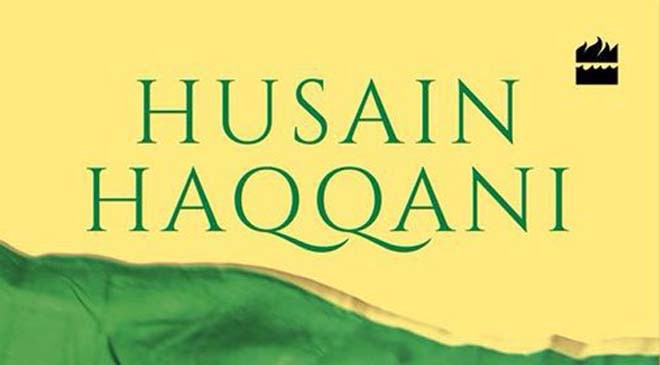
Husain Haqqani’s new book categorises his reflections on the perpetual quandary between theory and reality, and duty and desire that Pakistan and Pakistanis find themselves in

"The Supreme Court has also issued an arrest warrant for me out of nowhere. Since when does the supreme court of a country issue warrants? We don’t like what he says, treasonous conduct, new book coming, horrible, warrant issued!" said Husain Haqqani, launching his new book.
Haqqani is back with another book: something not taken well by Pakistan and its state machinery. Charged with two sections of the Pakistan Penal Code -- 120B for "hatching a conspiracy" and 121A for "waging war against Pakistan" -- Haqqani is like the rebellious rockstar on the run, a la Mohammad Ali in 1960s’ America, who doesn’t shy away from speaking his mind, even if it rubs the Pakistani government and establishment the wrong way.
And would you blame them for being paranoid? After all, Haqqani’s last two books were published by Indian publishers, Juggernaut and Harper Collins India.
It made much sense for India vs Pakistan (2016) to be published in India, but why must a book called Reimagining Pakistan: Transforming a Dysfunctional Nuclear State be published, out of Pakistan and that too, in India? The book’s contents answer those questions.
Reimagining Pakistan is a case for rethinking and reforming the basic ideological structure that Pakistan is based upon: i.e. the Two-Nation Theory.
Spread over eight chapters, the book categorises Haqqani’s reflections on the perpetual quandary between theory and reality, and duty and desire that Pakistan and Pakistanis find themselves in.
If there were three founding themes that the book could be awarded, they would be: the division between Pakistanis’ perception of their country and global perception of the same; the history of the creation of Pakistan and the redundancy of religion within it; and the invalidity of Pakistan’s ideology in modern times especially the Two-Nation Theory which led to a perpetual antagonism of the Indian state.
The following excerpt from the book highlights the book’s central theme considerably well: "The transformation of East Pakistan into Bangladesh should have been an opportunity to revise the two-nation theory and the ‘ideology of Pakistan’. The Bengalis had proved that ethnicity and demands for a rightful share of the country’s resources was a stronger factor in determining their nationalism than Islam."
And: "There is always a gulf between how a nation views itself and how others view it, but Pakistan is unique in terms of the breadth of that gap. While Pakistanis often do not see much of the criticism of their country as valid, outsiders describe it as an ‘incubator of terrorism’, a ‘crisis state’, or even as a ‘state perpetually on the brink of failure’. Perhaps it is the frequency and vehemence of outside criticism that makes Pakistanis defensively deny any fundamental defect either in the origins or trajectory of their country."
However, the most insightful revelation of the contents of the book is, in fact, the dedication: "To my children Huda, Hammad, Maha and Mira. And all the children of Pakistan, For whom the country needs to be reimagined."
A noble vision, but how well does Haqqani fare in his attempt at creating a new aura for the country of his birth?
His areas of focus are highlighted in the last four chapters. ‘Insecurity and Jihad’ underscores the state’s duplicitous jihadist security policy and its roots, starting from the Pakistan Movement and the immediate aftermath of its creation to the establishment of ISIS Khorasan faction along the Af-Pak border.
In the National-Security Theology sub-heading he underscores the Hadiths used to cite Pakistan’s perpetual animosity with India -- the Ghazwa-e-Hind and the Battle of Khorasan prophesies.
"…the ‘Ghazwa-e-Hind’ type of thinking has resulted in terrorist attacks within Pakistan and set the stage for divisions among jihadis that are hurting Pakistan’s security instead of enhancing it."
‘The Institution’ talks about the military’s role in upholding the abovementioned security policy and maintaining the inertia against the redefinition mission that the book embarks on. This inertia, Haqqani argues, is founded upon perpetual anti-Indianism.
‘Warriors, Not Traders’ discusses Pakistan’s economic woes and the state’s overreliance on debt, which, again, have been rooted in the circumstances of its creation.
"Most of Pakistan’s economic woes, however, reflect deep structural problems, some dating back to the country’s founding. That they are seldom discussed, let alone addressed, indicates the country’s single-minded emphasis on its ideological concern."
In ‘Avoiding the March of Folly’ Haqqani discusses American historian Barbara W Tuchman’s book that goes with that name and analyses government follies, which are founded on self-interest and in complete rejection of progressive policymaking. In light of Tuchman’s book, Haqqani urges Pakistan to look back at its rulers’ mistakes from the past and asks them to avoid repetitions.
This self-reflection is the heart of the case that Haqqani puts forward to ‘reimagine’ Pakistan, with the chapter also citing examples of Post-World War II Germany and Japan, Yugoslavia and 19th century Belgium as examples of nation building based on successful detachment from an ugly past and a desire for modernisation.
Interwoven with all the state facets that need a revamp is Haqqani’s regular reminder, which is aptly a part of the book’s title as well, of ‘dysfunctional nuclear’ programme that makes his intended reimagining an existential question as well.
However, while the book is a comprehensive cue to reimagine and redefine Pakistan, it doesn’t do that particular bit itself. Perhaps it has left that to the readers’ imagination.
Reimagining Pakistan: Transforming a Dysfunctional Nuclear State
Author: Husain Haqqani
Publisher: HarperCollins India
Year: 2018
Pages: 352
Price: Rs1,325